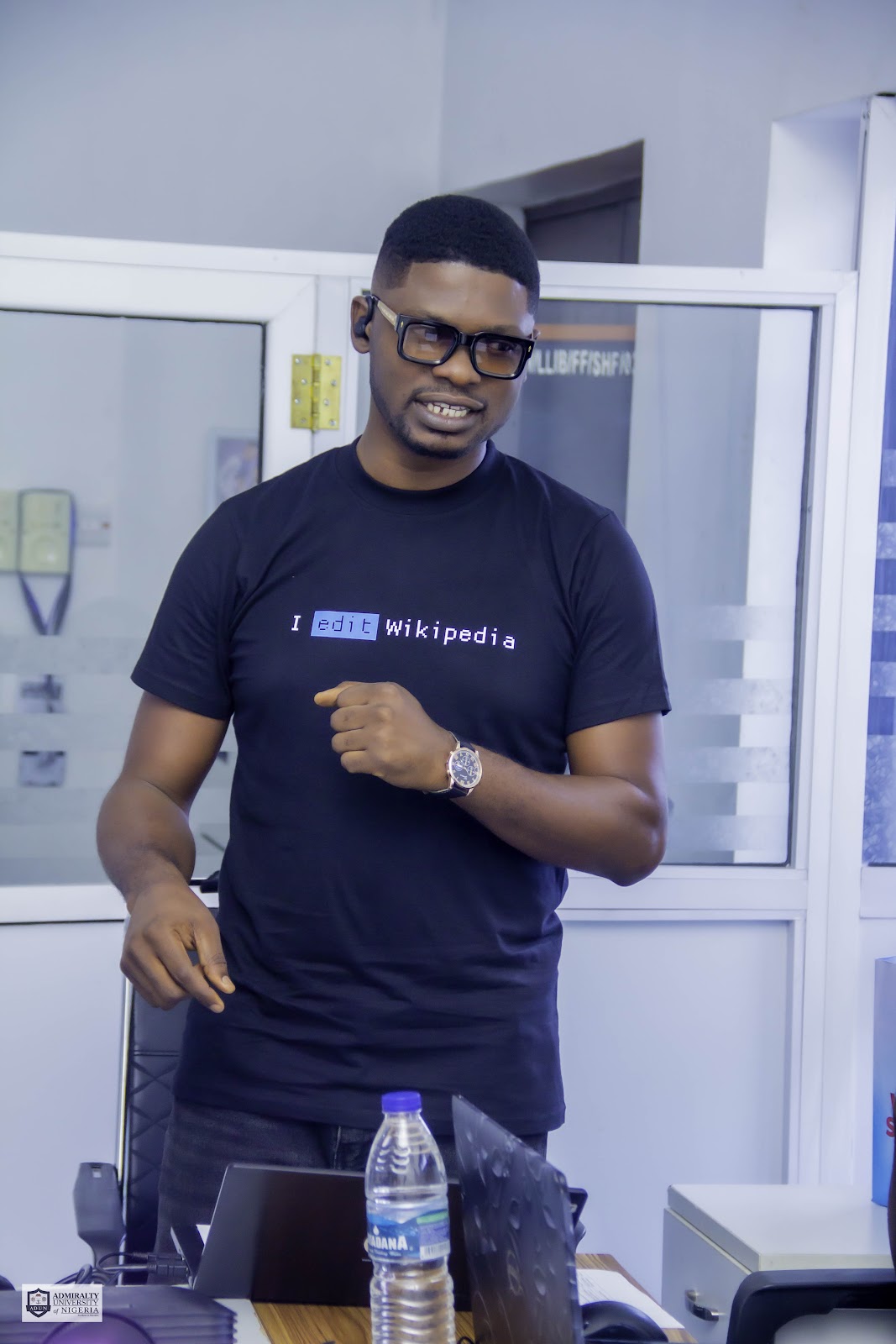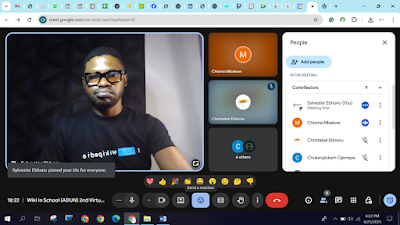By: Ukome Onyinyechi Hannah and Annunziata Giuseppina Karina (100 Level International Relations Students of ADUN and Participants of the Wiki in School Nigeria Project – ADUN 2025 Cohort)
Something remarkable started at Admiralty University of Nigeria (ADUN) on the 18th of June, 2025. It was the launch of the Wiki in School Nigeria Program 2025, a nationwide initiative supported by the Wikimedia Foundation (UG) Nigeria bringing together students and staff to create content on Wikipedia.
What Is the Wiki in School Program?
Wiki in School is a program where selected lecturers from Nigerian universities are trained to guide their students in editing and creating content on Wikipedia.
Session 1: The Onboarding (18th
June, 2025)
Our
first session held at the Faculty of Law Library. About 14 students and 5 staff were present. Mr. Sylvester Ebhonu, the project facilitator, welcomed everybody
and introduced us to what the Wiki in School project is all about. All participants
introduced themselves and their interest, making it feel like we were truly
part of a team.
The
University Librarian, Dr. Gladys Onyia, also gave opening remarks, explaining
how this project supports the university’s mission of preparing students for
the digital age. Then, Mr. Sylvester took us through a detailed introduction to
Wikipedia, its five pillars, and other related projects. We also learned how
Wikipedia works and about
Wikipedia's community of volunteer editors, its rules for factual and unbiased
content, and why it has become such a trusted source of information worldwide. We were shown how to create our own
Wikipedia accounts, and there was enough time for questions and refreshments at
the end.
Session 2: First Virtual Training (20th
June, 2025)
The second part of the training happened on Thursday, 20th of June, 2025 at 7:00pm via Google Meet. It was our first hands-on session where Mr. Sylvester showed us the types of edits we can make, from small things like fixing typos to big contributions like adding references or writing new articles. One of the most helpful parts of the training was the live demonstration using the University of Jos as an example. Mr. Sylvester showed participants how to search for existing articles, check what information was already there, and identify areas that could be improved. We also got to learn about using citations, linking words between articles (wikilinks), and how small edits can still make a huge impact.
By
the next day, June 21st, through the 'project outreach dashboard', we saw that our group
had already edited 14 articles, which had been viewed more than 6,000 times
globally. It was really a big motivation for us.
Session 3: Second Virtual Training (25th
June, 2025)
In our third session, we focused more on refining our skills. Mr. Sylvester checked in with everyone’s progress, answered questions, and went over how to properly add references to articles. He used the National Open University of Nigeria (NOUN) article to show us how to create links and structure our edits properly.
He also reminded participants about Wikipedia’s rules, for example, not deleting content unless there’s a valid reason. Mr. Sylvester emphasized the importance of editing responsibly so our accounts don’t get flagged. He also gave us an introduction to Wikimedia Commons, the platform where Wikipedia stores images and media.
Session 4: Physical Session & Campus Photo Tour (27th June, 2025)
The fourth session, which was held as usual at the Faculty of Law e-Library, started with Mr. Sylvester teaching us about user page creation reminding us to be neutral and avoid self-promotion or flashy bios. We then proceeded to the practical for Wikimedia Commons. He showed us how to upload photos the right way, how to choose proper copyright licenses, and explained what kind of media works well on the platform.
We
also learnt about Wikidata (Wikipedia’s structured database) and how it
connects facts across Wikipedia articles. Mr. Sylvester even walked us through
creating a real Wikidata item using the profile of Mr. Stanley Okereafor as an
example. We wrapped up that day with a campus photo tour, where we took
pictures that we’ll later upload to Wikimedia Commons.
We wish this project doesn’t end
This
project is really impactful and helping us learn how to research, how to write
clearly, cite sources, and work as a team online. We are even more happy about
the contribution we are making to our university, because every article we
edit, every photo we upload will help to put Nigeria (and ADUN) on the global map.
So far, Admiralty University of Nigeria is now on Wikipedia, and in the coming
week to wrap up our project (Wiki in School at ADUN for Research and
Scholarship Visibility) we will now focus on contributing structured data on staff, uploading educational
media, improving subject-based articles, and documenting scholarly publications
on Wikimedia platforms.
We’re not just students anymore, we’re now emerging Wikimedians contributing to something global.




















Comments
Post a Comment